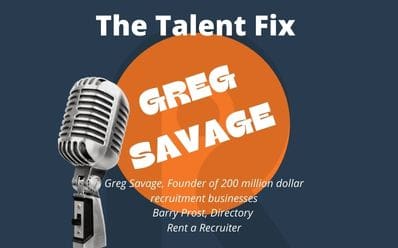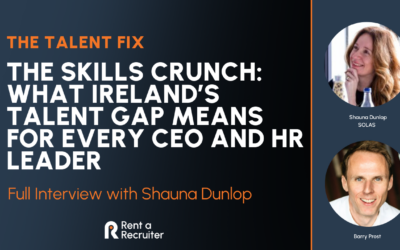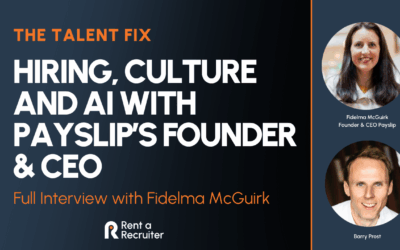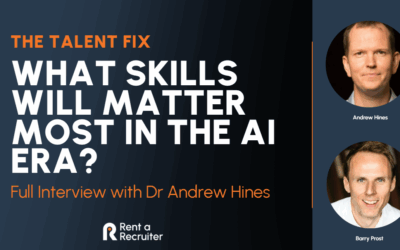The Talent Fix Speakers
Barry Prost has 20 years experience in international recruitment and has co founded award winning brands in the sector including Propel Consult, Yala Consult, and now Rent a Recruiter, whose mission is to be a leading international, technology lead, embedded recruitment services provider with operations in Ireland, United States, Middle East and Australia.
With a career spanning four decades, Greg is a founder of 4 highly successful businesses, is a trusted advisor and respected voice across the global recruitment and professional services industries, and a regular keynote speaker at conferences around the world. Greg is also the author of ‘The Savage Truth’ lessons in leadership & business.
Talent Fix Recruitment Podcast with Greg Savage
Welcome to this episode of The Talent Fix and I’m delighted to be joined by Greg Savage, who is recruitment since 1980, founder of 200 million dollar recruitment businesses, is on 16 recruitment boards and author of The Savage Truth. So hopefully I’ve done you justice there with that introduction, Greg, but I pass it over to you now.
Greg Savage
Thank you very much. Yes. Always frightening when somebody says, started in recruitment in 1980, but I am still going, so we should be happy about that.
Barry Prost
Good stuff, Greg. You’re our third guest from Australia. We’ve had Siobhane Savage on from Reejig and Neil Dundon, owner of Crypto Recruit. Don’t think Siobhan is any relative.
Greg Savage
No, I’ve met her and had a few conversations. The name Savage is actually I don’t know if you know, but there’s an Irish link there somewhere. Savages in Ireland.
Barry Prost
Yes, Siobhan came over from Ireland I believe. Very good.
What challenges are faced by the recruitment industry today?
We’re going to dive right into it, Greg. I would love to get your thoughts in terms of the challenges that we’re are facing recruitment businesses. And I know, your expertise is from the recruitment agency perspective, so if you could give us your couple of minutes on what challenges you think recruitment businesses are facing today?
Greg Savage
Sure. Well, that’s a big topic and I’ll reel off a few things and then when you get bored, stop me. But a lot of the problems, in the recruitment agency space is the same as those faced by talent acquisition, because, after all, everyone’s heading in the same direction. And of course, the overriding issue that’s not new to anyone else is talent shortages and how we deal with talent acquisition. And of course, that’s key for recruitment agencies because that’s all they’ve got to sell. But it’s also very critical card acquisition, who in some cases are slow, have been slow to realise that they’ve got to change their modus operandi the speed at which they move, setting their employer brand, etc. So, talent acquisition is obviously key. That’s not new for both parties and by that, I mean agencies and talent acquisitions. Finding good recruiters is a critical issue and continues to be so. But there is a looming or lurking might be a better word Barry, threat. And I’m seeing it emerging already, and that is we find ourselves and we should debate this and discuss this in a most unusual time, where we have all the signs of an impending downturn and by that, I mean high inflation, rising interest rates is true of the UK, I can’t speak for Ireland, but true of the UK, true of Australia.
We have this I can’t think of the right adjective, I’ll just say unfortunate war, which is not helping. And we have global tensions and it’s very likely that there will be some sort of downturn and when that happens, you normally see job flow slowing down. That has not happened. So, we’ve got high demand and yet we’ve also got the threat of recession. What we are seeing in some cases, and this is a trend that if you’re not seeing those listening to this, if you’re not seeing it yet, you might want to keep your air close to the ground because I’ve heard it in Australia and I just got back from the UK last week and I heard it there too. There are candidates who have moved from being super confident because they’ve had a year of being seduced and bribed and job offers and opportunities to suddenly becoming tentative and pulling out of the process mid process.
So that means somebody’s on a first second interview six, eight months ago, they’d be super Gung-ho and confident and they would feel that the boot was on their foot, so to speak. And now we’re having reports of them pulling out of the process and the feedback is they’re nervous about the future.
I better stay where I am every time I switch on the TV. And there’s a talk of a recession in both your country, not your country, but in the UK. And in this country, we’ve had a change of government in the UK in the last couple of days, but in this country in the last few months, a lot of uncertainty, interest rates rising, people can’t pay their mortgages and so you’ve got this weird situation of clients or employers, I should say desperate to hire and candidates perhaps on the cusp of pulling back.
Have you seen that in your part of the world at all, Barry?
Barry Prost
Well, of course we’re seeing it and I think we’re bracing ourselves for potential economic shock and rising costs, etc. And the costs of doing business is increasing. So luckily the job market, particularly in Ireland, has been quite resilient.
We’ve just opened in Australia as well, that’s been thriving since January and we set up operations in the US as well. And I think there’s 10 million vacancies at the moment in the US. So, again, I think it’s like you said today, everything, what we’re seeing on the ground is kind of very strong demand from employers for talent. But I think it’s maybe what’s around the corners that we’re probably a little bit unsure.
What do you think it takes today to be a successful recruiter?
In terms of how you see the skills, if you like, or the skills of being a successful recruiter because you’ve seen it, the industry go through multiple iterations.
What do you think it takes today to be a successful recruiter? And do you think the skills that are needed today are the same as they were in 1980?
Greg Savage
Wow, that’s a beautiful question because it plays right into my sweet spot. I hope this podcast is preparing for a couple of hours. I’m kidding. But the truth of the matter is, Barry, that recruitment is a marriage of art and science. And you’ve got on the one hand a lot of old dinosaurs who think it’s all art and we don’t need to worry about technology and they will beat the drum of just get on the phone and all the rest of it. On the other hand, you’ve got HR and rec tech people telling us that they can automate recruitment completely and disruptive. Both sides of that argument are fallacious. It is a blend of art and science.
A great recruiter will, to answer your question, be expert at the technology. And by that, I mean being able to source using technology, building an online brand, being able to use the ATS effectively and good recruitment companies and corporate hiring will automate the parts of the job that should be automated. And what are the parts of the job that should be automated?
Any part that does it more efficiently than a human being without harming customer experience. By customer I mainly mean candidate. So chatbots can be very useful, algorithms can be very useful and good recruiters are going to embrace the technology. But, the technology and the automation is not that much AI and agency recruitment even people talk about it all the time.
There will be more but there’s not that much. But mostly it’s just automation. The technology and the automation of the drudgery of the job has one major outcome that people need to understand. It frees up a good recruiter to be excellent at that part of the job that only human beings can do and that’s the influencing skills. And so that’s why I coined the phrase it’s a marriage can be an art of science because you have to be very good at technology. You have to be very good at what a good recruiter you said a good recruiter had. In 1980 I was on my desk today. I started a recruitment telephone plugged into the wall. There was a yellow pages Barry because that was our marketing database and there was an ashtray because everyone spoked in 1980, not me, but everyone else did. And of course if in that environment you weren’t interviewing someone or out at a client or on the phone, what on earth were you doing? There was no keyboard. So those recruiters were excellent at engagement skills, excellent at influencing skills, excellent at selling candidates over the phone, excellent at understanding the motivation of candidates and all those sorts of things need to make a comeback because recruitment got so transactional there are plenty of recruiters who made places without ever speaking to a client or a candidate.
I mean that was all done behind a keyboard and that can be completely automated and is already. A good recruiter will have great tech skills, great influencing skills, increasingly a good network. They will build a strong online brand to build their credibility and business development. We should talk about this.
Many recruiters have completely lost their business development muscle completely because jobs have been pouring in the door for two years. I know recruiters building 500,000 a million who have never done a cold call in their lives and never had a sales meeting in their lives. And that’s great. They’re very good at the transacting and it’s more than transacting, to be fair, because they’re very good at the candidate side when the wheel turns, they will not have the engagement skills, the credibility skills that will be needed.
So, if I could list it for you, I look for recruiters who have network, who have influencing skills or the potential to develop them, who are great listeners good questioners. Who also can embrace the technology, can build an online brand and have when I use the word influencing skills, to my mind that is covers things like consulting, advising, persuading, creating outcomes for the greater good. The word influence, the skill of influence can be used for harm. That’s obviously not what I’m talking about. No, I’m talking about for the greater good.
So that’s what a recruiter should be looking like, embracing those human skills that perhaps in 1980 were the only skills we needed and combining them with the tech savvy skills.
Barry Prost
Okay, excellent.
What categories of training are in demand today?
And then just segue that into the Savage Recruitment Academy, which is your eLearning platform. What categories of training are in demand today?
Grey Savage
Right, that’s a good question. I think the categories of training that are in demand see, the thing about our industry, and I’ve been in it for 42 years, so I feel as much as I love it, I have the right to criticise it.
We are an industry of short-term thinkers. We don’t think to the future enough. And so people want rookie training. They want how to approach candidates online, send better in mails, head, hunt people. And those are all very important things, don’t get me wrong, but I am trying to encourage them to get their recruiters to flex their BD muscle. We need to teach recruiters on how for example, I went into several recruitment companies in the UK and I asked this question. I said, if you could put a list of your top 25 clients on the wall, how many of those have you met in the last year? And the officer was universally zero.
I said, is there any reason you can’t see them? Are they in the office? Yes. Where’s their office? Down the road. Why don’t we see them? Okay, let’s put that one up. Let’s take every client we made a placement with in the last five years.
Have you spoken to them all in the last 100 days? And they just burst out laughing? Of course, they haven’t. Why haven’t we don’t need clients, Greg. We need candidates. And that’s exactly my point. I know that today we need candidates, but tomorrow, I promise you, you’re going to need clients. And if you leave it till the day you need them, they won’t take your call because they won’t know you.
So, in answer to your question, its very candidate focused on people and its very leadership focused. The ages. I think there’s a lot of leadership training, but there’s also a lot of training on the Savage Recruitment Academy, on how to as I said, it’s not just Business Development, but it’s nurturing clients.
A lot of recruiters are making a lot of money, but just dealing with the top tier of five or six clients who are doing a lot of hiring. What happens if the market turns and three of those five go dormant? Quite likely, quite possibly, in a downturn. What about your second-tier group? They’re not just waiting for your call. That will be long gone. And remember what critics forget, because we had a 10-12 year boom since the 2009 downturn, other than covid, a lot of recruiters have never lived through a downturn.
They have no idea what it’s going to be like when there’s a shortage of jobs. They will be praying for the return of a candidate type market when they’ve got a shortage of jobs, because every recruiter is hunting every client and the clients are not accepting the calls.
Barry Prost
Yeah, absolutely.
What does the future hold for businesses when it comes to recruitment?
So, kind of leading on from that. And when we look at the future, what does the future hold for businesses when it comes to recruitment, outside of a potential downturn and a potential switch to a more client or employer led market? What will you or the businesses you own or the businesses you coach be doing differently in the future, bigger picture wise, maybe just looking beyond the potential downturn?
Greg Savage
Yeah, well, I think a potential downturn will only be another twist of the cycle, and after the downturn, there will be an upturn. And that’s another story.
Sustainable Business
I think the smart companies are focusing on building a sustainable business, and I’m talking about recruitment agencies now. And by that, I mean one that drives in a good time and is very resilient in the downturn. And that would mean having a good mix of permanent placement revenue and annuity revenue, which would be temporary or contract or RPO. I think that would be a huge focus point, I think, having New Age recruiters who have the sorts of skills that I touched on earlier, Barry, and growing your own, because I don’t know if you realise this, I’m sure it was maybe somewhere in Ireland, but it certainly was in Australia that in April, May and June 2020 cost your mind back. April, May, June 2020 was when we suddenly realised that this thing was serious. It was huge. But despite government support, 36% of agency recruiters in Australia got fired. One in three. Now, most of those had less than one year experience and they’ve never come back to the industry. And now you know that you and every other recruiter owner in the world is trying to hire people with three years’ experience.
That is exactly replacing those that got fired. So, the whole generation was wiped out. So, as we know, when there’s a downturn, recruitment agencies really only have one lever to pull, which is salaries, because 75% of if I look at the PNL of your company, which I haven’t done, but if I did, I know what’s on it. 75% of every dollar a year you spend is on salary. So if your GP drops by 50%, that’s the only lever to pull. And then what happens is companies let all the recruiters go and they shrink down from 30 recruiters to ten, and then the market recovers twelve months later and it takes them five years to grow back. So the smart people you ask the question what they’re doing is they’re building resilience so that they won’t have to do that. They may not make as much money in the downturn, but they’ll keep their forces strong. I mean, the upturn comes, they’ll gain market share. The other thing is that they’re looking at what sectors they should be in.
Looking at what sectors are growing
Very critical. So what are the growing sectors? What’s likely to be the demand sector in three to five years? Is it accounting? Is it tech? Is it medical? What is it and do I have the ability to pivot if I’m in the inverted commas wrong areas? So that’s another thing they’re looking at. Building a second tier of management is absolutely pivotal, that we’ve got some good recruiters, we’ve got the owners, three or four of them, and then we’ve got a wide gulf in between. And that means our company will never grow beyond 15 or 16 people, and that means it won’t be sustainable.
Investing in technology
Implementing the right tech is what smart people are doing, investing in technology. And what you’ve got to look for in technology is technology. That automates the part I said before, the part of the job that should be automated. And the main goal of that is, yes, efficiency and cost savings, but mostly to give more time to the recruiters to engage with their candidates. So, you never implement technology, even if it saves you money, if it’s going to harm the candidate experience. When I say you never do that, that is my belief, and we see it every day when we try to talk to an airline or an insurance company.
They’ve got all the technology, all the bots, you can’t get anything done. Experiences is hopeless. So smart recruitment companies will not go that way, they will use technology. And I’ve got a great example of one of our companies, in fact, I founded it along with three people harder working than me, and it’s now turning over 120,000,000. It’s called people to people and I don’t do any work in it, I just give advice, which they now ignore.
They introduced a chat bot and on the website and candidates were encouraged to go to the chat bot or the recruiter they could choose. More than half chose the chatbot, which is fascinating, but they only wanted to ask three or four questions. Is the job in Sydney? Does it pay 100 grand? Do I need a degree? And then the chatbot asked them three questions, and then they spoke to somebody. It saved the company. It’s a big company with 100 recruiters. It saved 250 hours of time. And I asked the question, which frankly was the smartest question of the day, what have we done with the time? It’s not about saving the times. What we’ve done with it.
That 250 hours of consultant time a week. Have we spent that engaging with candidates now and getting better service to candidates? If the answer to that is yes, then it was a good piece of tech. So that’s the thinking that we’re looking for.
Barry Prost
Excellent. And I’ve had to because I’m just conscious of the time we’re coming to the end of our chat. And thanks again, Greg. But just on the technology piece, if I had to ask you, you’re talking about the right technology.
What technology on the market are you seeing as having the most impact for agencies?
Grey Savage
Well, I’ll be frank with you. We need to go right back to ground zeros and get recruitment companies to use the ATS Pro. Right? But most recruitment companies’ candidate database or their database of candidates is actually a candidate graveyard. You know, that 30% or 40% in the UK. The same in Australia of jobs filled by agencies where the candidate came from a job board. In 40% of cases, those candidates were already on their database.
Can you think of anything more dysfunctional than that, then paying money to a job board and getting your recruiter, spending all day sifting through irrelevant people to find one candidate and placing them, and that candidate was already on your database. So, the starting point is using the technology we’ve got, making sure that and then I’ve got some smart agencies that are actually building in chatbots and algorithms that will search the database for the recruiter. Say you’re looking for a UX designer with certain criteria, it will search the database and it will send a text to ten or twelve candidates and say, hey, we haven’t spoken to you for a while, but we’ve got a job to suit your profile.
Would you like a recruiter to call you? Simple as that. And they get a yes, the recruiter calls. Now, that’s the kind of technology, it’s not that sophisticated, but the recruiter can do the outreach as well. But imagine if while she or he is doing that, the chatbot is going and finding all these candidates that are in the database. We’re also proud of our databases. If you say we’ve got 100,000 candidates, we’ve been operating 20 years, it’s absolute nonsense in most cases because we don’t have any way of accessing those candidates. But if we can and then the chatbot actually reaches out, and then the candidate elects to call in or to require a call request a call. That’s smart use of technology. So those are the sorts of things that I’m really enjoying seeing because it is exactly what I’m describing. It’s the marriage of tech to the marriage of art and science. The chatbot is the tech, but the human being still talks to the person.
Barry Prost
Brilliant. Well, look, on that note, Greg, thank you so much for your time today. Great to catch up. And that’s we’re going to sign off today and cheque us out wherever you get your podcast.



